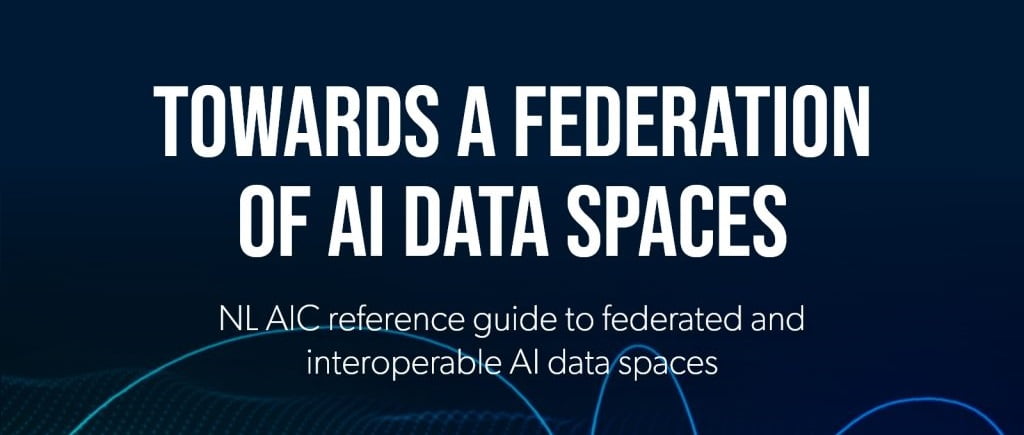Accelerating AI implementation
Better access to data will mean a head start in AI. That is not merely a target for the Netherlands: there is also international interest. The EU wants a fair market in which data from governmental authorities, companies and the public at large can be used safely when in the general interest and to boost the earnings capacity of the commercial sector. The EU has adopted the term ‘data spaces’ for this method of effectuating data sharing. Data spaces are used where multiple parties are managing the data and it is not self-evident that it will be made available to all those involved. In short, it boils down to making good agreements that are combined with standards-based technology.
Designing federative data spaces
This guide gives a concrete summary of the tool available and the lessons learned for getting to understand AI data spaces better and for setting them up. Producing and distributing this guide is only the initial step for the NL AIC. Developing data spaces with relevant partners is the next stage.
The specific design of federative data spaces is a key milestone in achieving the objectives of the EU and the NL AIC. The key to success for any such approach is interoperability, in technical, semantic, organisational and legal terms. In other words: whether we understand each other, have made solid agreements, are sticking to the rules and are capable of handling the implementation and maintenance. This creates an inclusive system where data sharing is based on open and transparent standards. It is crucial that this system is underpinned by trust, so that it remains clear that data only gets used for the purposes intended by the original data custodian or controller. This principle is referred to as ‘data sovereignty’ and it is the cornerstone of what is known as a ‘trust system’. Relying not on good faith but on an organised trust structure.
Data sovereignty
To give an example: instead of sending confidential information about patients to a service provider’s central database, a solution can be created that involves sending an algorithm to a hospital. That algorithm and its parameters can then be trained locally within the hospital’s IT environment before leaving the hospital again, improved by what it has learned, without any patient data being shared. The algorithm can then ‘visit’ several hospitals in the same way, gaining access to multiple data sources as it does so. The end result is a secure solution and an improved AI algorithm.
Future developments
Additional documents will be published over the course of 2022 that will further flesh out how trust can be organised and interoperable AI data spaces can be built. These can act as:
- References for the development of AI data spaces, with an extensive functionality set to support the challenges and requirements of AI.
- Clear guidelines for assurance of trust and interoperability between individual AI data spaces.
NL AIC affiliates can use these documents for designing and implementing their own data spaces. All parties outside the NL AIC that are involved in AI and data sharing are also encouraged to make use of these lessons and tools to get a better understanding of the potential of AI data spaces. Given that these documents are based on the international state of the art, organisations can assume that they will be implementing a future-proof solution in an international context.
The aims of the NL AIC
The NL AIC is aiming to co-create and build ten AI data spaces with partners in the Netherlands based on the guidelines given in this guide. The ten AI data spaces will be implemented in various sectors. This is how the NL AIC is helping realise the vision of a flourishing ecosystem in which organisations can share data safely and with confidence while retaining control of the data sharing in various processes.
Interested?
You can download the guide ‘Towards a federation of AI data spaces’ here. If you’re interested in more information about data sharing, visit the working group’s web page.




